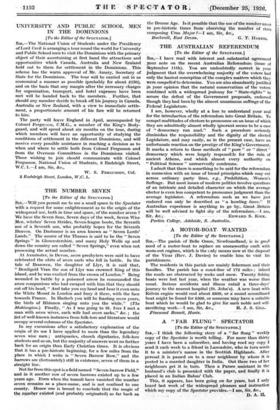THE AUSTRALIAN REFERENDUM . - • • . [To the
Editor of the SPECTATOR.]
SIR,—I have read with interest and- substantial agreement . your note on the recent Australian Referendum (issue of September 11th). You are undoubtedly correct in- your judgment that the overwhelming majority of the voters had only the haziest conception of the complex matters which they were compelled to determine. You are also abundantly justified in your opinion that the natural conservatism of the voters combined with a widespread jealousy for " State-rights" to secure the defeat of the Government proposals, endorsed though they had been by the almost unanimous suffrage of the Federal Legislature.
I am, however, wholly at a loss to understand your zeal for the introduction of the referendum into Great Britain. To compel multitudes of electors to pronounce on an issue of which they are admittedly almost wholly ignorant seems to be a case of " democracy run mad." Such a procedure seriously diminishes the responsibility and the dignity of the elected Legislature, and may easily, as in the present case, have an unfortunate reaction on the prestige of the King's Government. It marks a return to those methods of " pure " or " direct " democracy which were largely responsible for the ruin of ancient Athens, and which almost• every authority on " Political Science " unreservedly condemns.
I admit.that there is something to be said for the referendum in connexion with an issue of broad principles which may cut across ordinary party lines, .e.g., Prohibition, -Women's Suffrage. But most issues of modern politics involve questions of an intricate ,and detailed character on which, the average elector is even less competent to pronounce judgment than the average legislator. A referendum such as we have just endured can only be described as " a howling farce." If Australian experience is anything to go •by, Great ,Britain will be well advised to fight shy of the referendum.—I am,


































 Previous page
Previous page